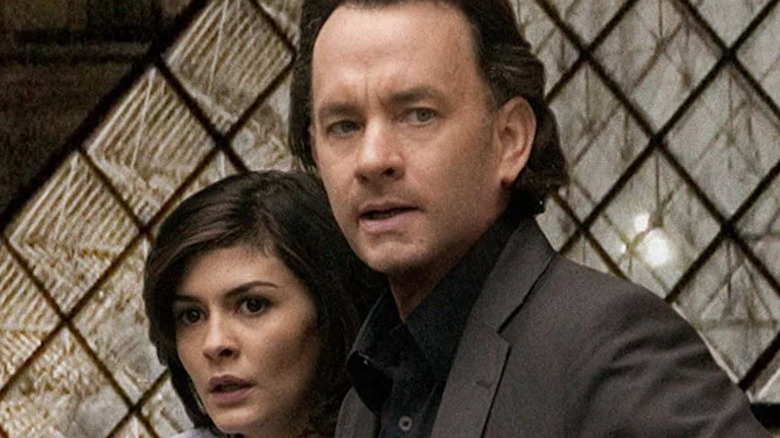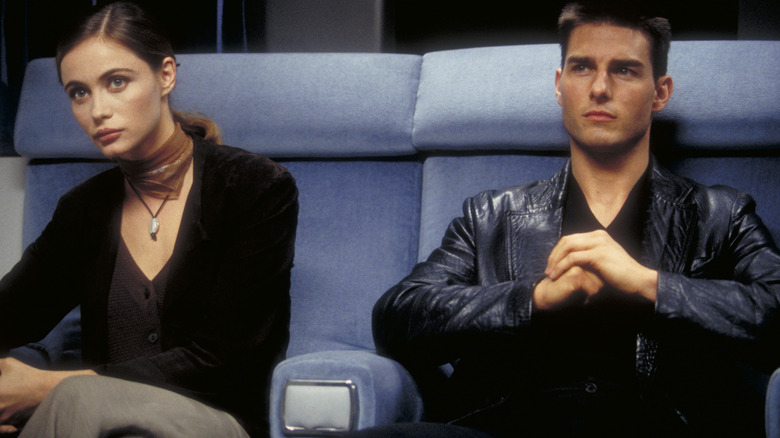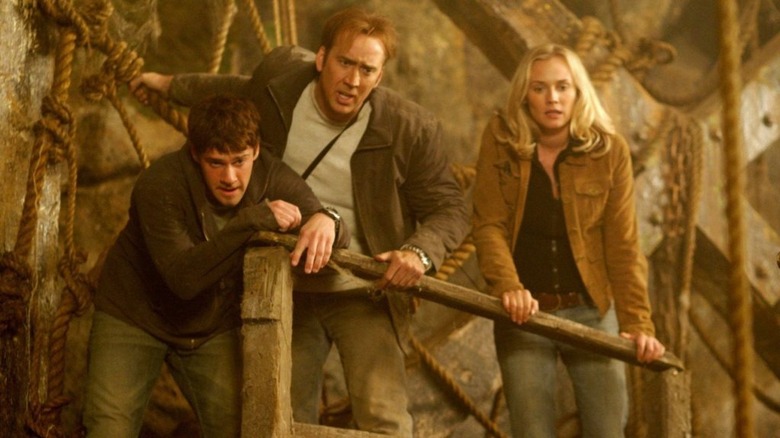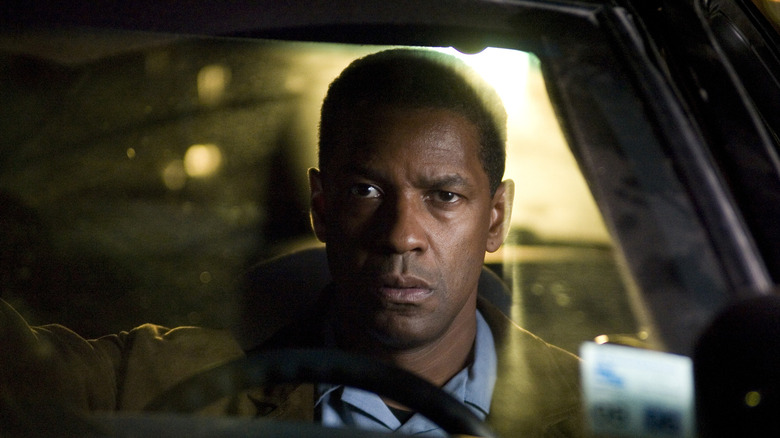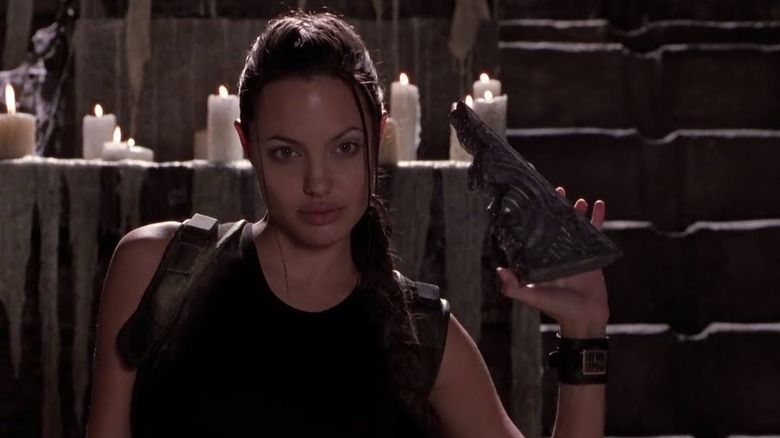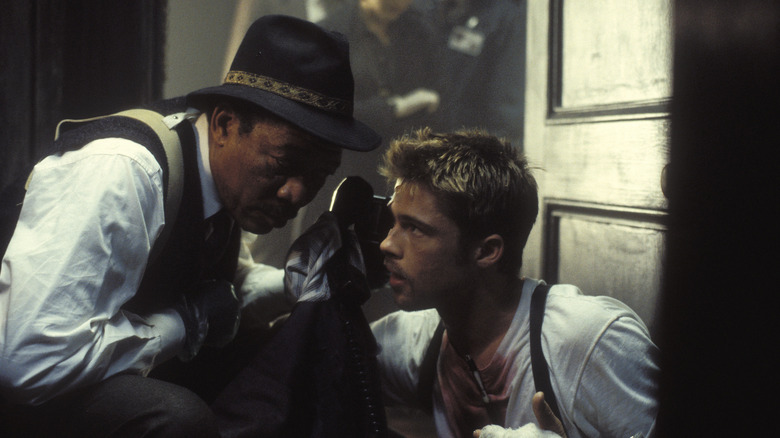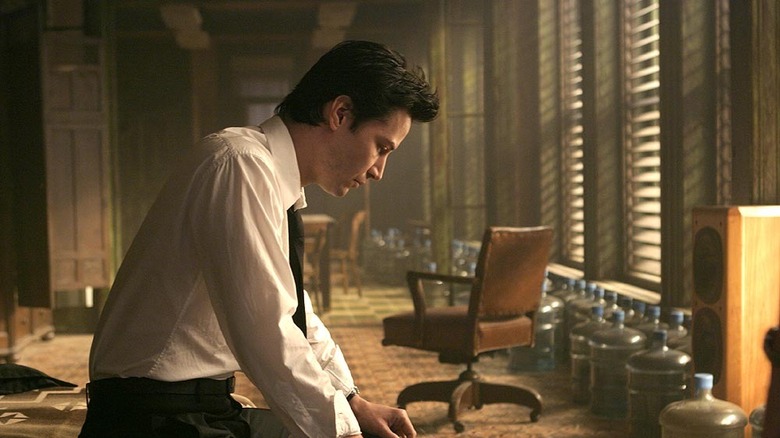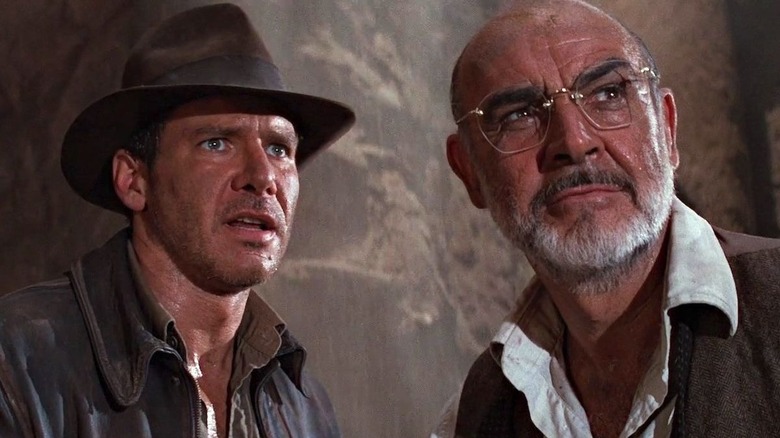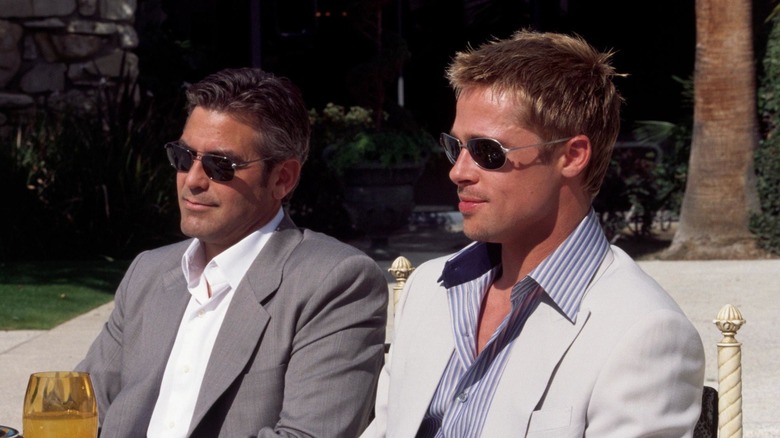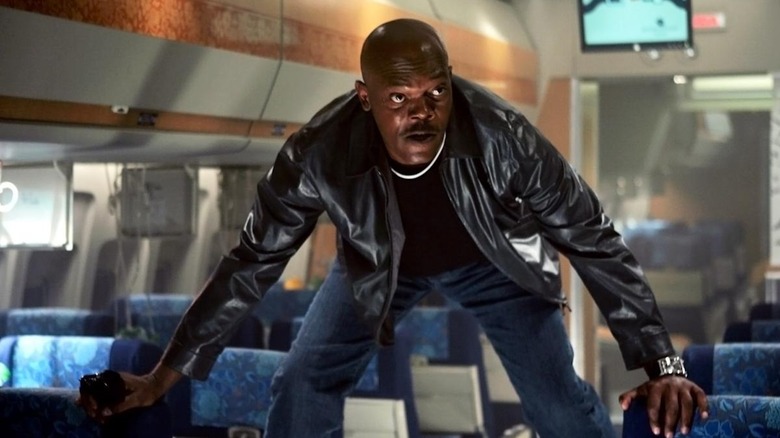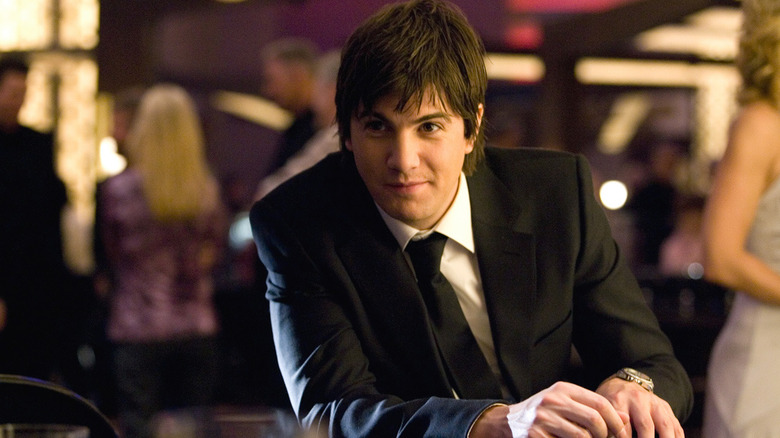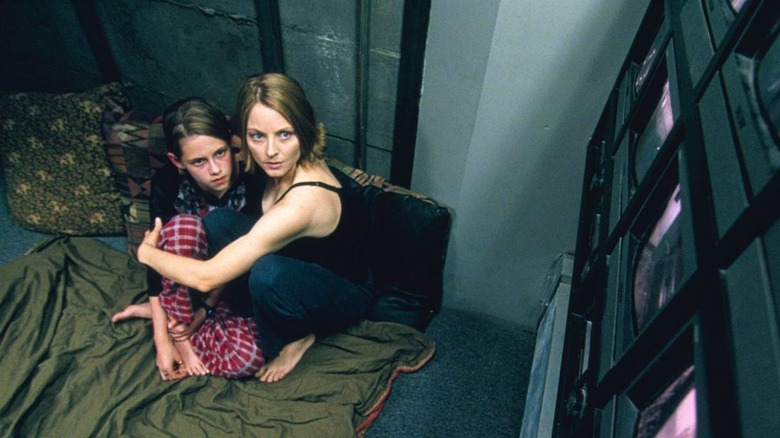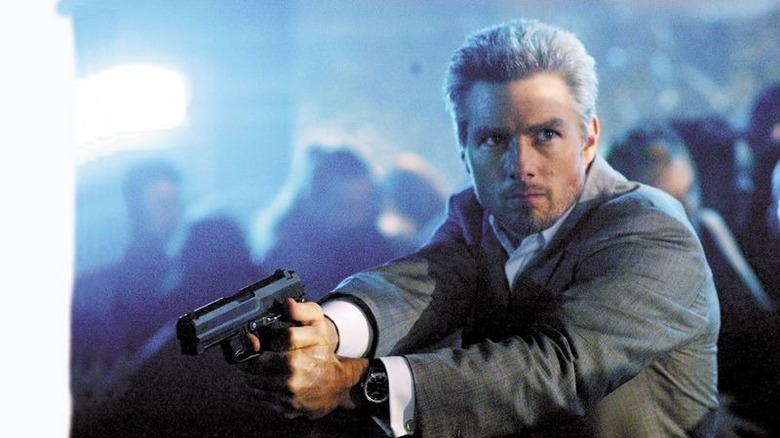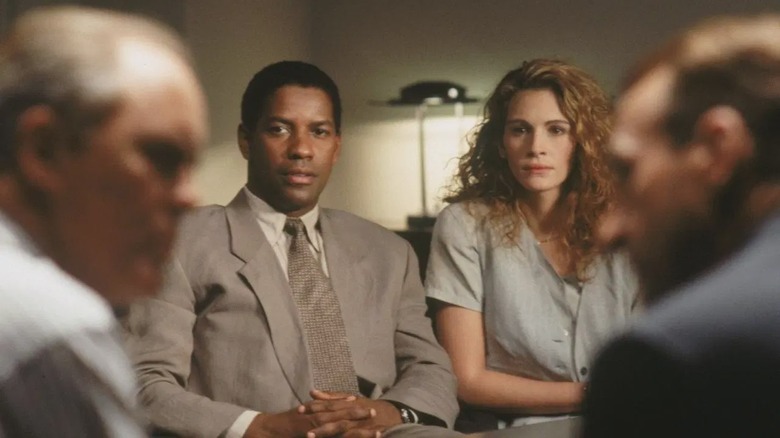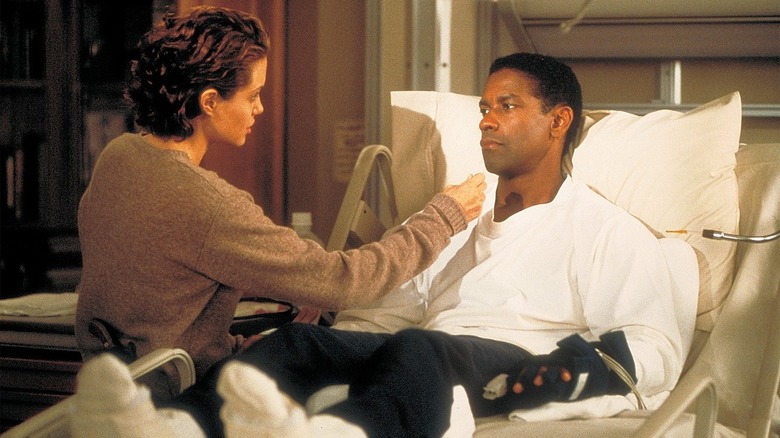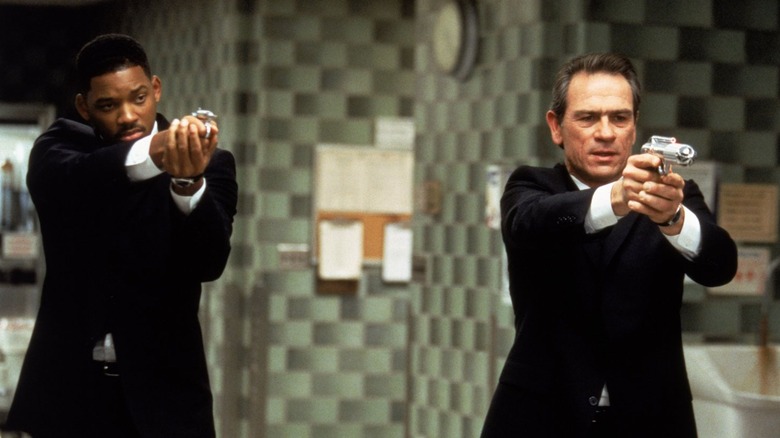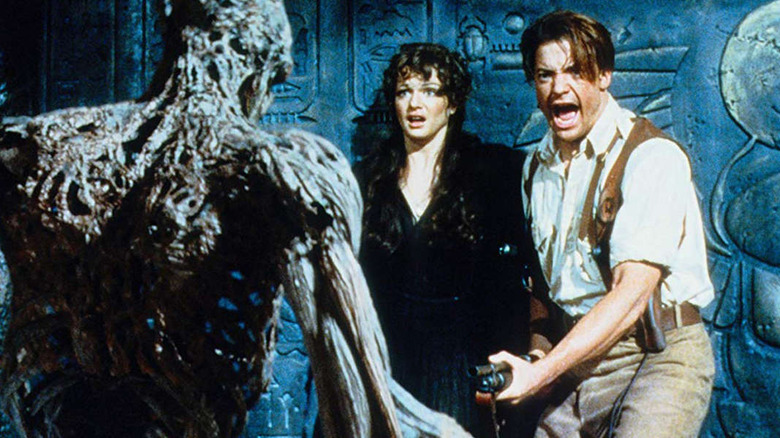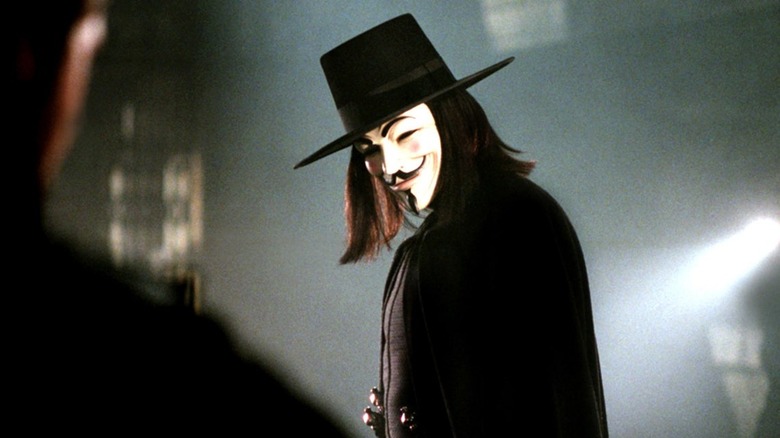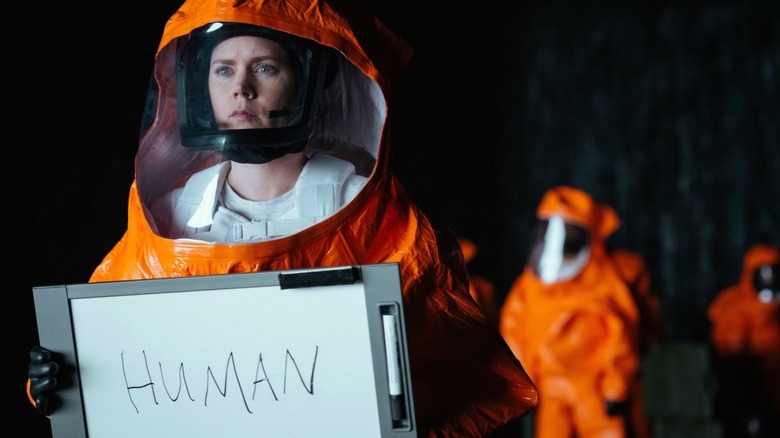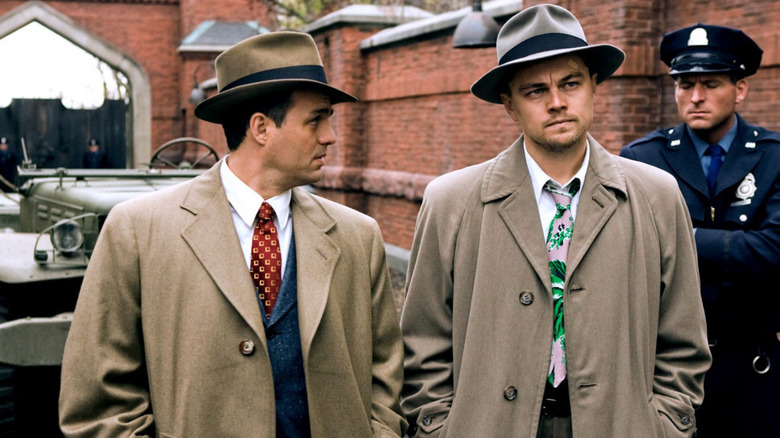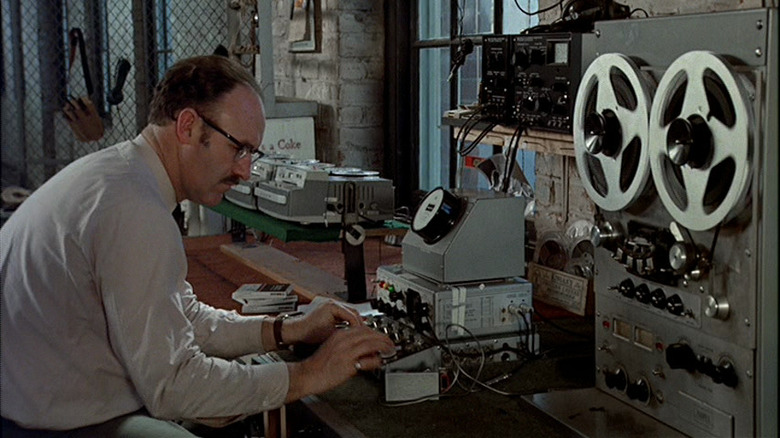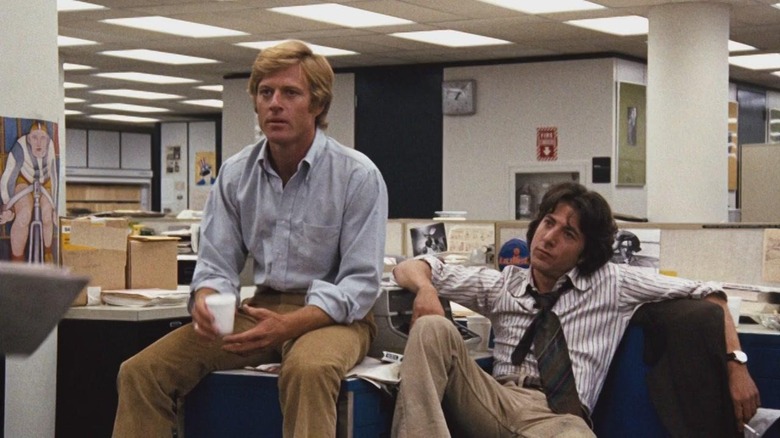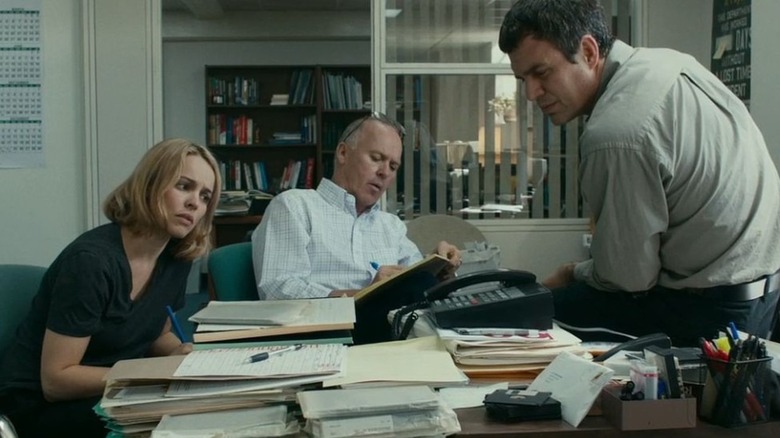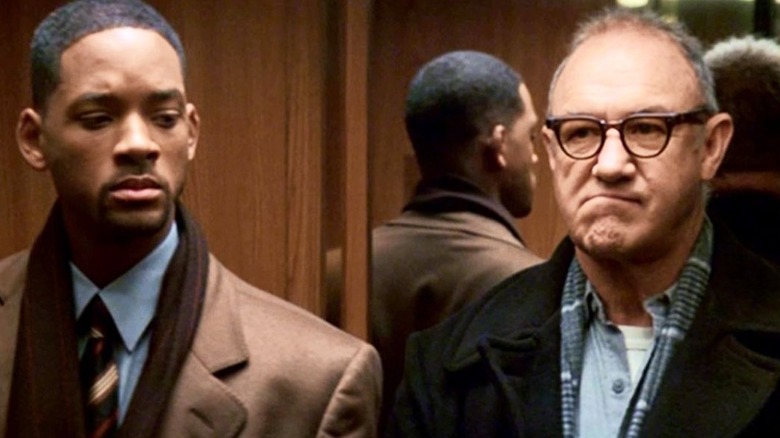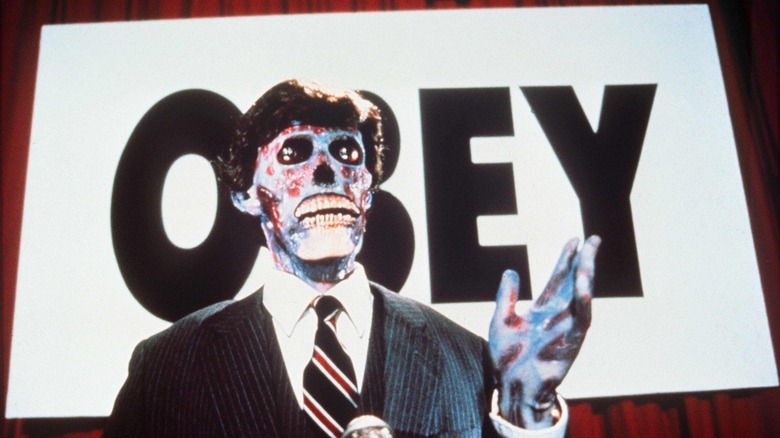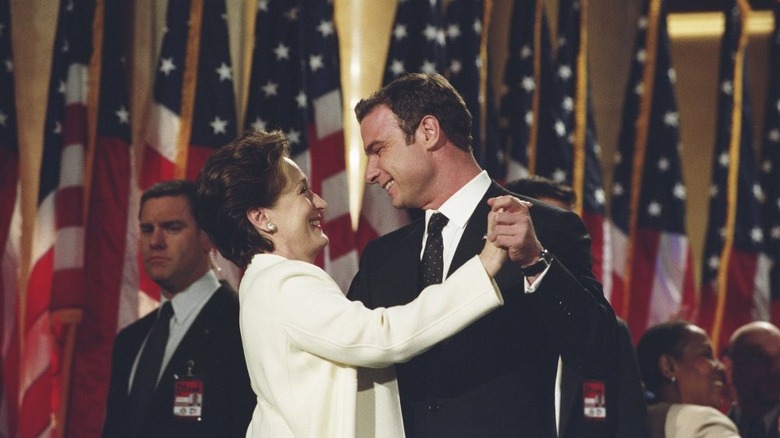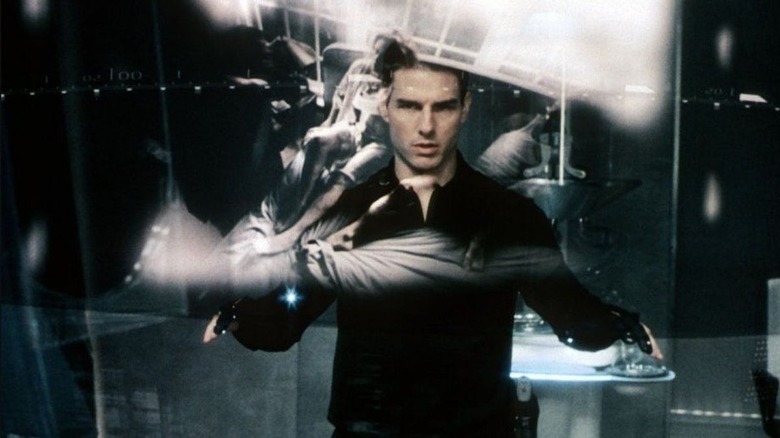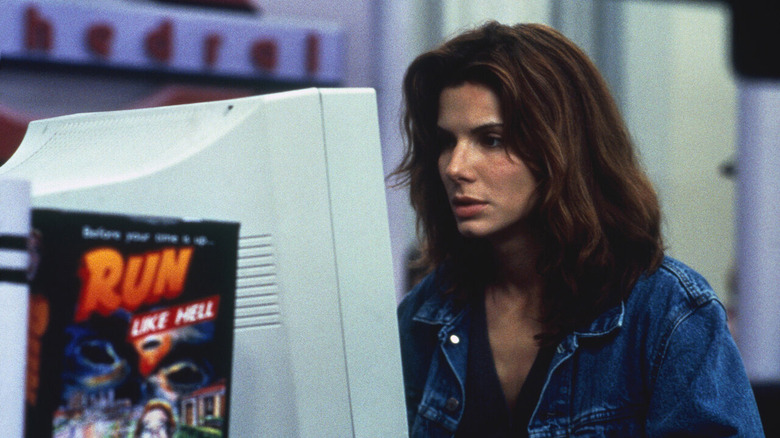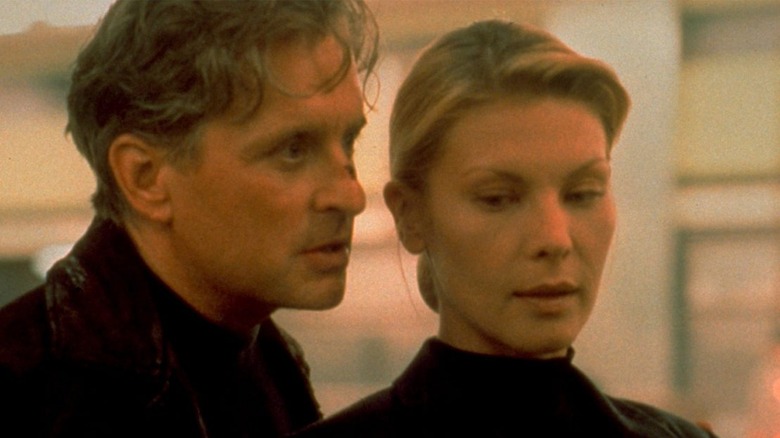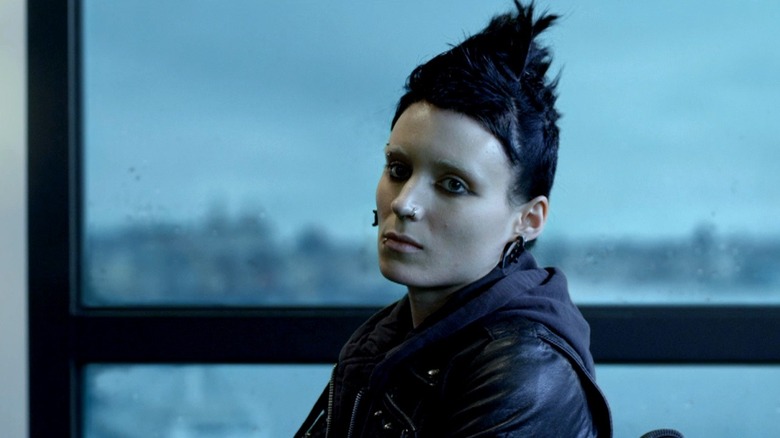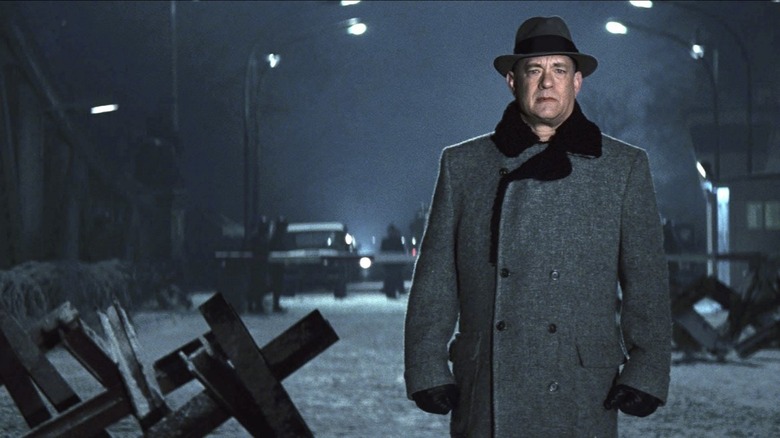30 Movies Like The Da Vinci Code You Should Watch Next
"The Da Vinci Code" is one of those movies that's just so intensely satisfying. A big-budget blockbuster starring Tom Hanks, directed by Ron Howard and with a score from Hans Zimmer, the film delivers exactly what it promises: Hanks being a charming everyman, thrilling action, and a conspiracy theory that could unravel the very fabric of society. With a stacked supporting cast including Audrey Tautou, Ian McKellen and Alfred Molina, the film exists right in that sweet spot of mid-2000s studio films with the budget to pull off a thrilling story, the source material to execute, and the leeway of Hollywood silliness that makes it all breezy fun.
Of course, "The Da Vinci Code" is far from the first movie to depict a story about a really smart guy uncovering the truth about a far-reaching conspiracy. Nor is it the first film to jump right into the action, hardly letting up for the rest of its runtime.
When the end credits roll and you find yourself wanting more of that adrenaline, those thrills, those mysteries and charming leads, where do you turn? Here is a list of 30 movies that will give you all the same "Da Vinci" feels.
Mission: Impossible (1996)
One of the best things about "The Da Vinci Code" is that it's full of action. Tom Hanks' Robert Langdon becomes a murder suspect mere minutes into the film, and from then on must feverishly work to uncover a millennia-old mystery that will clear his name. If you're looking for an even more high-octane adventure involving murder and nefarious plots, you might want to check out "Mission: Impossible."
The first in what is now a six (and counting) film series, the first "Mission: Impossible" movie translated the hit '60s series to the big screen all the way back in 1996. Though the series now has a reputation for putting Tom Cruise in the most outlandish, death-defying situations one could imagine, the first film (directed by cinema legend Brian De Palma) has a more composed feel. It follows Ethan Hunt (Cruise), an American spy framed for the murder of his colleague when a mission goes sour. He then compiles a team of experts to help him break into the CIA and steal a file that will prove his innocence. Like Robert Langdon, Ethan Hunt must uncover a conspiracy in order to clear his name, only Hunt is slightly more graceful in his tactics than Langdon, perhaps best illustrated in a now-classic heist scene involving wires and a motion-sensitive floor.
National Treasure (2004)
This one you might have been able to come up with on your own, but it has to be included for accuracy's sake (and because it's a classic). Starring Nicolas Cage, "National Treasure" follows a historian and code-breaker named Ben Gates who has spent his entire life searching for an artifact said to date back to the inception of the United States. After Gates' partner betrays him, Gates decides he must steal the Declaration of Independence in order to find the next clue and protect the treasure from his treasonous partner.
Like "The Da Vinci Code," "National Treasure" sinks its teeth into some ancient conspiracies and tasks its leading men with discovering the truth — before it's too late. While the story in "The Da Vinci Code" is at least marginally believable (owing at least in part to how Hanks sells it), the plot of "National Treasure" exists almost entirely in the realm of the absurd; this is actually part of the movie's charm. Sure, none of this could really happen; it's all just an elaborate excuse to hear Nicolas Cage declare "I'm gonna steal the Declaration of Independence!" And it's worth it.
Déjà Vu (2006)
Much like "Da Vinci," "Déjà Vu" stars an A-list actor trying to stop something catastrophic from happening. Also released in 2006, "Déjà Vu" follows an ATF agent named Doug Carlin (Denzel Washington) in pursuit of a terrorist (Jim Caviezel) responsible for a deadly bombing. Carlin is brought in to help a top-secret government program that possesses technology that allows them to observe what happened four days earlier. Carlin realizes that this technology may allow him to go back in time and prevent the crime from happening altogether.
Perhaps even more so than "The Da Vinci Code," "Déjà Vu" requires a suspension of disbelief on the part of the viewer. If you start thinking too hard about the film's central premise, it doesn't quite hold up. But with the undeniable talent and charisma of Denzel Washington anchoring the proceedings, it's a reasonably entertaining action flick that treads just high enough above the surface to resist utter silliness.
Lara Croft: Tomb Raider (2001)
Like "Déjà Vu" before it, "Lara Croft: Tomb Raider" is a silly film saved by the talents of a charming lead actor. Based on the video game of the same name, it stars Angelina Jolie as the titular heroine and daughter of a famed archeologist, now a rich heiress with an interest in ancient artifacts. Skilled in disciplines such as sword fighting and horseback riding, Lara must race against time to retrieve two halves of a powerful artifact before it falls into the wrong hands.
While 2018's reboot "Tomb Raider" tells a slightly more believable story (and doesn't feature Angelina Jolie grappling with a middling British accent), there's something campy and fun about the original that just couldn't be replicated in the 2018 version (or this film's 2003 sequel "Lara Croft Tomb Raider: The Cradle of Life"). While Lara Croft wriggles her way out of situations in ways Robert Langdon could never dream of, what the two characters have in common is a love for knowledge and the smarts to solve ancient puzzles — all while racing against the clock. If you're interested in ancient mysteries with some camp thrown in, "Lara Croft" should be your next stop.
Se7en (1995)
Famed director David Fincher loves puzzles and mysteries, which is why you'll see several of his movies on this list. The first of these is "Se7en," which stars Morgan Freeman and Brad Pitt and essentially launched a genre all its own of dark, twisted mystery still going strong decades later in something like Matt Reeves' "The Batman."
The film follows veteran detective William Somerset (Freeman), who teams up with rookie David Mills (Pitt) to tackle a series of grisly, complicated murders. They soon come to realize they are the work of a serial killer (a barely-glimpsed, discreetly-credited Kevin Spacey), connecting each of his kills to one of the seven deadly sins and making his way down the list. Mills, with a pregnant wife (Gwyneth Paltrow) on his mind, descends the depths of hell while questioning if this is the sort of world one should bring a child into.
If you like "The Da Vinci Code" but have a weak stomach, stop right here; "Se7en," which features some incredibly gory crime scenes, is definitely not for you. But if you're looking for a mysterious story with a more gruesome perspective, it should be right up your dark, dingy, blood-soaked alley. With one of the most terror-inducing lines of all time — "What's in the box?" — "Se7en" is sure to activate your love of puzzles and, most likely, leave you curled up in the fetal position.
Constantine (2005)
Every Langdon film deals with phenomena relating to religious iconography or religious groups. The series suggests that within these religious institutions — more accurately, the Catholic church — there are various sects trying to maintain (or destroy) tradition. If you're looking for another film that takes religious symbolism literally, you might want to check out "Constantine," starring Keanu Reeves in a live-action take on the DC Comics character.
A demon hunter and suicide survivor, Constantine is burdened with the knowledge he is hell-bound, unless he performs enough good deeds to get back in God's good graces. While helping a cop (Rachel Weisz) investigate the supposed suicide of her twin sister, Constantine becomes embroiled in a paranormal struggle involving both angels and demons ("Constantine" might make a nice double feature with the sequel to "The Da Vinci Code," aptly titled "Angels and Demons").
"Constantine" is a decidedly dark flick that takes some pretty big narrative and visual leaps; though it wasn't received very well by critics at the time, Keanu considers it his best role to date, and it's worth watching for Peter Stormare alone.
Indiana Jones and the Last Crusade (1989)
Let's be honest: Since the early '80s, every movie with an action hero trying to get a McGuffin is simply trying to be Indiana Jones. So, why not watch one of the classics, if only to appreciate that Langdon could not run if Indy had not first swung his way across a pit of snakes?
Though not often regarded as the best of the Indiana Jones films — that distinction typically goes to the first in the series — "The Last Crusade" is no less a classic Indy film and the one that most closely connects with the object of Robert Langdon's desire in "Da Vinci": the Holy Grail. "Crusade" follows Indiana Jones as he searches for his father, a medievalist who disappeared while he was searching for that fabled cup.
Just like Langdon, Indiana is joined on his adventures by a beautiful genius (Alison Doody) who helps him on his mission. "Crusade" is something of an origin story as well, with a teenaged River Phoenix playing young Indy in the film's dynamic open. In a genius casting choice, Sean Connery plays Indiana's father, giving us much insight into Indy's background and upbringing. It's an entertaining romp bolstered by the formidable talents of Spielberg, George Lucas and John Williams — the latter of whom produces some stunning music to accompany the adventure.
Ocean's Eleven (2001)
One of the most satisfying things about movies like "The Da Vinci Code" is that, for two hours, we get to watch someone who is really good at something. There's something so pleasurable about watching people who are competent getting the job done.
This distinct pleasure is one of the reasons heist movies are so fun to watch — and a key element in Steven Soderbergh's 2001 remake of the Rat Pack classic "Ocean's Eleven," resulting in a heist film just as thrilling today as it was the day it premiered.
"Ocean's Eleven" follows a group of criminals – eleven, natch – who plan the most ambitious casino heist the world has ever seen. Led by roguish thief Danny Ocean (George Clooney), who has just been released from prison on parole, his team plans to rob three Las Vegas casinos simultaneously. Soderbergh's film is a stylish, incredibly cool take on the original. While Robert Langdon and the "Ocean's" team might not be on the same side, they both have moral codes that they stand by, and they both undeniably know their stuff.
Snakes on a Plane (2006)
Like "The Da Vinci Code," "Snakes on a Plane" is a mid-2000s, much-hyped film that leans into the breezy fun of a blockbuster. Though "Snakes" star Samuel L. Jackson certainly has a markedly different attitude than the rather nerdy Robert Langdon, both films — which were released the same year, in 2006 — are action-packed adventures that follow their central premises all the way to a satisfying conclusion.
The central premise of "Snakes on a Plane," is, of course, that there are snakes on a plane. There is actually an explanation for this — it's a dangerous criminal's attempt to kill a witness aboard the plane — but the explanation doesn't really matter. Like "National Treasure," "Snakes on a Plane" includes one of the most memorable lines of the 2000s, a line that was actually added after fans decided it should be so. The famous line aside, Jackson is typically charismatic and hilarious in the role, and like "The Da Vinci Code," it's action-packed for nearly all of its runtime. The snakes in this case may be literal rather than symbolic, but the two films could make for a popcorn-worthy double feature.
21 (2008)
A heist movie, if heist movies were about math and gambling, "21" is another film that delivers the satisfying thrills of really smart people pulling off seemingly impossible feats with competency and a twinkle in their eyes.
Directed by Robert Luketic and based (somewhat) on a true story, "21" follows a gifted MIT student (Jim Sturgess) struggling to pay his tuition. Pairing up with some genius classmates and led by an unconventional professor (Kevin Spacey), they use their math talents to take Vegas by storm. After the Sturgess character initially enjoys his new gig — and the money that comes with it — he finds himself in dangerous territory via a threatening casino enforcer (Laurence Fishburne).
Like with "The Da Vinci Code," it's fun to watch the characters' brains work in "21," and the way the movie visualizes all these thoughts, calculations and manipulations. You'd be hard-pressed to find someone who finished this movie and didn't want to learn how to count cards afterward, the dangers of it notwithstanding. If you like the idea of math — but like, in a fun way — "21" should be next on your list.
Panic Room (2002)
Though you might not describe Fincher's "Panic Room" as a puzzle movie, what it does have in common with "Da Vinci” is that it's a suspense-packed flick that maintains its intensity for nearly the entire runtime. Whereas the plot of "Da Vinci'" takes time to explain, the premise of "Panic Room" is simple. A recently divorced woman (Jodie Foster) and her diabetic daughter (Kristen Stewart) have a new house in New York City. When three men break in, Meg and Sarah hide in the most secure room in the house: The panic room. Complicating matters is that what these brutal men are searching for is in the panic room itself.
Like "Da Vinci',' "Panic Room" tells a tightly constructed story with a satisfying ending. Though Foster and Stewart seem like no match for the ruthless burglars (led by Jared Leto), they have plenty of tricks to even the playing field. If you're looking for a film that offers thrills in a much more succinct package than "Da Vinci'," give this Fincher classic a shot.
Collateral (2004)
Aka the last great Michael Mann movie, "Collateral" brought non-stop action, thrilling chase sequences and a handheld, digital urgency to an LA tale from the streets told by the master.
"Collateral" brings together Jamie Foxx (as a cab driver) and Tom Cruise (as an assassin), with the former becoming an unwitting accomplice in the latter's plot to eliminate all the witnesses to a crime. A cop (Mark Ruffalo) and prosecutor (Jada Pinkett Smith) soon find themselves involved in what becomes an increasingly dangerous, tense situation.
Though Cruise is typically known for playing characters who are at least nominally the good guys, he really sinks his teeth into this role; it's a treat to see him use his action-star skills in such a sinister way. Foxx, like Hanks' Langdon, plays an unlikely hero who finds himself in way over his head. With some brilliantly shot action scenes — who doesn't love to watch Tom Cruise running at full speed? — and an undeniable sense of cool, this neo-noir is a movie you can really sit back and enjoy.
The Pelican Brief (1993)
Another high-stakes mystery movie from the 1990s starring Denzel Washington, this Alan J. Pakula hit paired him with the red-hot Julia Roberts for a tense tale regarding the uncovering of a conspiracy that could put lives at risk.
Roberts plays a law student who composes a legal brief about the assassination of two supreme court justices. When the professor she was having an affair with is murdered, she realizes she is on to something big, and is forced to go on the run. She is helped by a journalist (Washington), and together they uncover a wide-reaching conspiracy involving top-level government officials.
Like "The Da Vinci Code," "The Pelican Brief" is a tightly-wound thriller where the stakes only get higher as it goes on. Plus, like Tom Hanks, A-lister Denzel (along with Roberts) is an actor who can make almost any script worth watching.
The Bone Collector (1999)
Another film that casts Denzel Washington as a determined man trying to uncover a mystery before it's too late, this Phillip Noyce thriller follows a beat cop (Angelina Jolie) trying to catch a serial killer who steals bones from his victims. She enlists the help of Lincoln Rhyme (Washington), a quadriplegic expert in forensic criminology. With Amelia on the scene and Lincoln — along with his nurse, played by Queen Latifah — at home analyzing clues, they attempt to stop the killer before he finds his next victim.
While it might be considered a slightly above-average B-movie today, there's something about this decade that makes even the most uninspired films compelling. In "The Bone Collector," there's something earnest about the performances and the dedication with which the characters carry out their duties that sells an otherwise mediocre script. Sure, it's no "Malcolm X" or "Fences," but "The Bone Collector" is no less a Washington effort that succeeds in what it's trying to be.
Men in Black (1997)
1997's "Men in Black" depicts a secret organization of a different sort than the one found in "The Da Vinci Code." The film follows Kay (Tommy Lee Jones) and Jay (Will Smith), two agents who work for a secret government agency that deals with all things extra-terrestrial. While going about their duties as agents, the pair stumble upon an alien terrorist determined to assassinate ambassadors from rival galaxies.
Significantly more far-fetched in nature than "The Da Vinci Code," "Men in Black" leans significantly more into comedy. While it still involves tightly-guarded secrets and a dangerous conspiracy, "Men in Black" often plays these plot points for laughs, while still delivering enough action and memorable set pieces to entertain thrill-seeking audiences. If Hanks' Robert Langdon is a little too serious for you, sunglasses-clad Will Smith might be a good antidote.
The Mummy (1999)
There's something so wonderful about a well-done adventure film, a movie genre that just doesn't seem to deliver as much in the present day. Though it wouldn't quite be accurate to call "The Da Vinci Code" an adventure film — it's a bit too serious for that designation — it does have something any good adventure film needs to be successful: plenty of ancient mysteries. One of the very best within the adventure genre is one that has become considered a classic: 1999's "The Mummy."
Brendan Fraser plays an American adventurer in the Stephen Sommers flick, alongside Rachel Weisz as an English librarian; together, they travel to Egypt to start an archeological dig. While there, they accidentally unleash an ancient curse and awaken a 3,000-year-old mummy. Though certain aspects of the film haven't aged well — the Egyptian stereotypes can be particularly hard to endure — Fraser and Weisz are utterly charming, and a delight to follow through the dusty deserts of Egypt.
V for Vendetta (2005)
Though "The Da Vinci Code" certainly hints at the fact that the upending of society as we know it is possible, it stops short of actually going there (the audience comes to know the truth about Mary Magdalene, for instance, but the rest of the world does not). One film that does take the dissolution of society seriously is 2006's "V for Vendetta."
Set in London, now a fascist police state following a world war, Natalie Portman plays a young woman saved from the secret police by a masked vigilante known as V (Hugo Weaving). Inspired by Guy Fawkes, V uses terrorist tactics to destroy the fascist state and free people from oppression, as she becomes one of his closest allies in the struggle.
In addition to teaching a generation of uninformed Americans about Guy Fawkes night, "V for Vendetta" is also an effective and surprisingly moving take on revolution. Written by the Wachowskis, the film is a very dark story about fascism that does not pull any punches when it comes to the violence therein. Nonetheless, it remains an inspiring film and one of Natalie Portman's best roles (the veracity of her British accent notwithstanding).
Arrival (2016)
In "The Da Vinci Code," Robert Langdon is a "symbolist," which means he's an expert on interpreting symbols and decoding what they mean in different contexts. In 2016's "Arrival," Amy Adams plays a linguist brought in to help communicate with a group of aliens who have touched down on Earth. The stakes are even higher in "Arrival" than they are in "Da Vinci," as the fate of the entire universe is at stake if this woman can't communicate with the aliens in time.
At its core, "Arrival" is a movie about language and communication, and how these things shape our perception of the world. It's also about time, of course, but such a concept is shaped by our understanding of language. Though "The Da Vinci Code" can be cerebral in one sense of the word, it doesn't hold a candle to the magnitude of the questions asked in "Arrival." It's a big film with a big scope, and we're not talking about the budget.
Shutter Island (2010)
This Martin Scorsese outlier is a real mind-bender, and like "Da Vinci," deals with revelations that constantly shift and evolve the narrative. The film follows a U.S. Marshall (Leonardo DiCaprio) and his partner (Mark Ruffalo) as they travel to an asylum on a remote island to investigate the improbable disappearance of a murderous woman. The hospital itself appears very dark and ominous, and Teddy comes to realize that things are not what they seem.
"Shutter Island" could certainly be described as a mystery, but the problem that must be solved is not the one the film initially presents. With an M. Night Shyamalan-level twist, the film is not one that you'll easily forget. It also includes one of Leonardo DiCaprio's best crying performances, if the moody Scorsese ambiance wasn't enough to hook you in already.
The Conversation (1974)
Possibly the single best film on this list you may not have seen, Francis Ford Coppola's paranoid thriller is still influencing movies today, and helped make the 1970s the heyday of government conspiracy films.
Starring Gene Hackman, John Cazale, and a young Harrison Ford, the film follows surveillance expert Harry Caul (Hackman), who is hired to track a young couple. Haunted by a past case that went wrong, Harry becomes obsessed with the surveillance tapes and is convinced the couple in question are going to be murdered.
Released the same year as Coppola's "The Godfather Part II," the film was nominated for three Oscars and remains one of Hackman's all-time greatest performances. Though it can be fairly slow-moving compared to a high-octane mystery like "The Da Vinci Code," "The Conversation" is a movie bleeding suspense and anxiety through its entire runtime. While it might look different from the thrillers of today, it's a brilliant example of how incredible tension can be built without any gun-slinging or car chases.
All The President's Men (1976)
Despite the timing of its release, "The Conversation" was not actually about the Watergate scandal. One 1970s film that did tackle Watergate specifically was 1976's "All the President's Men." This Alan J. Pakula masterpiece tracks the all-too-real true story of how the Watergate scandal was broken by the press, following Washington Post reporters Bob Woodward (Robert Redford) and Carl Bernstein (Dustin Hoffman) as they uncover the scandal with the help of a mysterious informant nicknamed Deep Throat and under the gruff-but-supportive eye of managing editor Ben Bradlee (a masterful Jason Robards).
Like "The Conversation," "All the President's Men" doesn't have nearly as much action as "The Da Vinci Code," but it is a flawless film that subtly builds tension until it becomes overwhelmingly thrilling. Though we all know how things turned out in the end, it's no less captivating to watch these two intrepid reporters put their lives on the line in pursuit of the truth. Though it can be somewhat jarring to adjust to the slow-burn pace of films from this era when you're accustomed to action-packed adventure films of the 2000s, "All The President's Men" is well-worth the investment.
Spotlight (2015)
For the most part, it seems like conspiracy movies had their heyday in the 20th century ("The Da Vinci Code" notwithstanding). But, there's one modern-day film that feels more in line with movies like "All the President's Men" than any other movie of its time. Released in 2015 but set in 2001, "Spotlight" follows a group of journalists at the Boston Globe tasked with investigating a priest who has been accused of molesting more than 80 boys. The reporters — played by Michael Keaton, Mark Ruffalo, and Rachel McAdams — must conduct interviews with the victims and uncover secret documents in order to find evidence of a cover-up within the Catholic church.
In a way, "Spotlight" combines the journalism focus of "President's Men" with the narrative of a Catholic cover-up seen in "The Da Vinci Code." Like the tension-filled conspiracy films of the 1970s, "Spotlight" is thrilling without resorting to any of the Hollywood gimmickry you might find in a film like "Da Vinci" (there are no explosions in sight in "Spotlight"). So, if you're looking for thrills and chills from a more serious perspective, "Spotlight" is a no-brainer.
Enemy of the State (1998)
One of the last great Gene Hackman performances (sorry, "Welcome to Mooseport"), this thriller casts the screen legend alongside Will Smith on the run from a dirty NSA official (Jon Voight) who assassinates a congressman in order to secure the passage of a new wide-reaching surveillance bill. As a labor lawyer with a videotape of the murder, Smith's character is framed for the crime and enlists an ex-intelligence officer (Hackman) to prove his innocence.
Directed by Tony Scott — known for intense, adrenaline-fueled action in films like "Top Gun" and "True Romance" — "Enemy of the State" is a thoroughly entertaining movie that sees Will Smith in peak action-star form. More of a conventional action hero than Hanks (something that actually works in Hanks' favor), Smith pulls off what is a fairly serious role for someone who initially broke through as a rapper/comedian. If you're looking for another film with an eternally topical conspiracy theme, "Enemy of the State" still holds up.
They Live (1988)
A touchstone of modern paranoia, this John Carpenter classic has gone on to fuel everything from movies (where do you think "Free Guy" got the idea for those sunglasses?) to real-life conspiracy theories (the darkest corners of the Internet read like deleted scenes) to art and clothing. Who would've thought a movie could be so influential that starred ... "Rowdy" Roddy Piper?
Though monsters, killers, and other unspeakable creatures are scary on their own, what's really scary about these things is finding yourself in a situation where no one believes you. This type of paranoia and fear was brilliantly depicted in early horror films like "The Blob" and "Invasion of the "Body Snatchers," and continued to be a popular horror theme for decades after. Such a feeling of suspicion also permeates a film like "Da Vinci," even though it doesn't fall within the horror genre.
One of the most underrated uses of this narrative device is found in Carpenter's "They Live." It follows a man named Nada (Piper) who finds a pair of sunglasses that reveal to him what the world really looks like. What he sees while wearing them is that the media is filled with subliminal messaging trying to keep people in line, and most of the people in charge are actually aliens intent on dominating the world and keeping its citizenry docile. With this new information, Nada tries to free the world from this extra-terrestrial mind control. Like Langdon, he is able to see something others can't, which is why the two films would make an especially entertaining double feature.
The Manchurian Candidate (2004)
A remake of the 1962 John Frankenheimer/Frank Sinatra classic, Jonathan Demme's "The Manchurian Candidate" similarly follows a virtuous soldier (Denzel Washington), this time imagined as one who returns from the Gulf War to terrible nightmares and the sneaking suspicion that something terrible was done to him and his compatriots. Though lauded as a hero, he begins to doubt that his former squad-mate, Sergeant Raymond Shaw (Liev Schrieber), who is now a vice-presidential candidate, is actually a hero after all. As Shaw becomes more powerful, and Washington's memories of what actually happened during the war begin to return, he must stop Shaw's rapid political ascension.
Though the 1962 "Manchurian" is the true classic, the remake is not without its merits, and simply by virtue of being more modern, feels tonally in line with 2006's "The Da Vinci Code." Plus, with such a great cast — Meryl Streep, Vera Farmiga, and Jon Voight also star — it's difficult to dismiss the film on any level.
Watching the original back-to-back with the remake would certainly make an interesting double-feature — communism is swapped out for capitalism in the remake — but so would the 2004 version and "The Da Vinci Code." Like other Denzel films on this list, "The Manchurian Candidate" sees the actor fighting, against all odds, to discover the truth, something Langdon can certainly relate to.
Minority Report (2002)
Spielberg and Cruise teamed up on this Philip K. Dick-based story set in 2054 and following a "pre-crime" unit where police use advanced psychic technology to arrest murderers before they even do anything wrong. Everything is going smoothly until the head of the unit, John Anderton (Tom Cruise), is accused of the murder of a man he hasn't even met.
Like many thrillers of the government conspiracy variety, "Minority Report" questions the power of governments and the people who are tasked with wielding the technology they possess. While this doesn't quite describe the plot of "The Da Vinci Code" — the powerful institution in question is the Catholic church, not the government — both Langdon and John Anderton are men accused of murder who must find their ways out of a dangerous situation. If this terrifying prospect thrills you, "Minority Report" is in your future.
The Net (1995)
One of the most amusing aspects of films from the late 1990s is how they depict the early days of the internet. Movies like "Johnny Mnemonic," "Hackers," and "The Net," all take the mysterious world of cyberspace as their object of study. But it's "The Net" that you should watch if you're a "Da Vinci" fan.
With Sandra Bullock as a computer programmer embroiled in a digital conspiracy that has the power to disrupt the very fabric of society, she finds herself in danger when she comes into possession of a mysterious ... wait for it ... floppy disk. The woman's identity is suddenly erased — all through the power of "the net" — resulting in a tense, mid-'90s quest to conquer dial-up modems and use an AOL trial service disk to fight back while hoping her mom doesn't pick up the phone in the kitchen and kick her offline. Okay, that last part may be made up, but while "The Net" is certainly not Oscar-worthy material, Bullock shows signs of the star she was becoming at the time, and the film serves as an amusing detour on the road to conspiracy-movie-land if you're willing to overlook its silliness.
The Game (1997)
Okay, maybe this should just be a list of David Fincher movies; but the filmmaker found a '90s/'00s groove with dark, mind-messing thrillers, and to discuss this realm without his oeuvre would be like giving someone a jigsaw puzzle with half the pieces missing.
The poster for "The Game" is literally made up of puzzle pieces, and for good reason: The flick follows a well-off banker (Michael Douglas) who lives a solitary, predictable life until his estranged brother (Sean Penn) gives him a strange birthday gift: A real-life, personalized game for Nicholas to play. Think of it as an escape room, with the entire world as the room.
At first, everything seems harmless enough; then the movie kicks in, with the game becoming increasingly disconcerting and the Douglas character fighting for his life.
Like "Da Vinci," Fincher's tense classic is filled with clues that its protagonist must decipher in order to uncover the truth. While the titular game in Fincher's film is not some vast conspiracy like what Robert Langdon is up against, the stakes feel every bit as high. If you're looking for a creepy puzzle with similarly creepy characters (no Hanks everyman in sight), "The Game" will keep you on your heels.
The Girl With the Dragon Tattoo (2011)
Fincher's take on "The Girl With the Dragon Tattoo" follows Rooney Mara as a strange, standoffish investigator with brilliant hacking skills. Teamed with a disgraced reporter (Daniel Craig) hired by an elderly industrialist (Christopher Plummer), the unlikely pair set out to solve the 40-year-old mystery of his niece's disappearance.
Their investigation becomes increasingly dangerous as they uncover dark secrets about this family that they would prefer not revealed. This leads to Nazis, sadists, and murderers, all in an effort to uncover the truth — and escape with their lives intact.
Though the 2009 Swedish version of the film (and its two sequels) are generally considered more faithful adaptations of the bestselling Stieg Larsson novels, Fincher's chilling style — and the film's impressive cast — makes Fincher's American take worth watching. Be forewarned, "The Girl With the Dragon Tattoo" is about 100 times darker and more disturbing than the very PG-13 "The Da Vinci Code," but if that's what you're into, you've found your next mystery to solve.
Bridge of Spies (2015)
Another Spielberg-directed film, this classic cold-war conspiracy movie details a pilot (Austin Stowell) captured by the Soviets after they shoot his plane down, sentencing the man to 10 years in prison. Recruited by the CIA, a New York lawyer (Hanks) travels to Berlin to try and secure his release. The plan is to conduct a prisoner exchange, returning convicted spy Rudolf Abel (Mark Rylance), who Donovan himself defended in court.
"Bridge of Spies" is a classic Spielberg/Hanks collaboration (much better than 2017's aggressively mediocre "The Post"), taking a familiar formula and carrying it out with grace and grit. Sure, it's nothing you haven't seen before, but Hanks is such a sympathetic, humanizing actor that the story is given a pathos it would not otherwise earn; Spielberg's masterful directing doesn't hurt. If you want some more Hanks in your life without all the religious symbolism and puzzle-solving, "Bridge of Spies" is your best bet.
